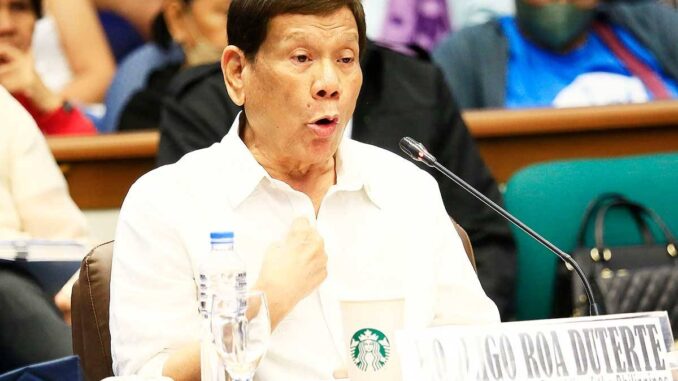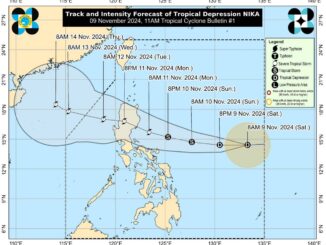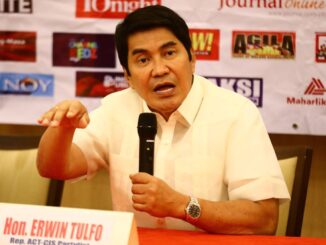
(UPDATE) FORMER president Rodrigo Duterte took full legal responsibility for the alleged involvement of some policemen in extrajudicial killings (EJK) and offered no apologies for his bloody war on drugs that claimed the lives of more than 6,000 suspects — mostly poor men — without the benefit of a trial.
Attending the first Senate Blue Ribbon subcommittee hearing on his war on drugs, Duterte defended his campaign, which is also being investigated by the International Criminal Court (ICC) over allegations of crimes against humanity.
“For all of its successes and shortcomings, I and I alone take full legal responsibility for what the [concerned] policemen had done pursuant to my order,” Duterte said in Filipino and English.
NO APOLOGIES Former president Rodrigo Duterte delivers his statement at the Senate hearing on his administration’s war on drugs on Oct. 28, 2024. PHOTO BY MIKE ALQUINTO
“I will take responsibility and should be the one to go to jail, not the policemen who merely followed my orders. They are pitiful. They were just doing their job,” he said in a prepared statement.
Senate Minority Leader Aquilino Pimentel III, chairman of the Senate blue ribbon subcommittee, said the public hearing would examine the Duterte administration’s enforcement of anti-illegal drugs laws.
“Did it follow the laws and rules? Was it compliant with the letter of the Constitution, as well as with the values and principles contained in our Constitution? Let us therefore answer the cries for justice from our people,” the senator said.
“Let us reform not just the Philippine National Police but the entire nation of public service. We want to know the truth, not only because it can set us free but also so we can strengthen the rule of law and then heal our land,” Pimentel said.
Duterte denied accusations that he gave monetary rewards to policemen who killed drug suspects during a buy-bust. “It is not state-sponsored killing. I did not say such a thing because I’m a lawyer.”
He said that when he was Davao City mayor — and even during his presidency — he instructed policemen “to encourage [the suspected] criminals to fight, encourage them to draw their guns.”
He admitted that he has his own “death squad” but did not elaborate when Sen. Risa Hontiveros asked him to describe the structure of that death squad.
“That is my instruction. If they fight back, kill them so that the problems in my city will end. When I became president, that was also my instruction during the command conference in Malacañang,” he said.
Duterte had a faceoff with former senator Leila de Lima and families of drug suspects believed to be victims of EJK.
De Lima was detained in 2017 at the Philippine National Police Custodial Center on what she described as trumped-up drug charges.
De Lima denied the drug charges and said they were politically motivated because she criticized Duterte’s bloody war on drugs. The Muntinlupa Regional Trial Court in 2023 dismissed all the drug complaints against her.
De Lima testified that when she was still with the Commission on Human Rights, she investigated alleged EJKs conducted by the so-called Davao death squad against criminals.
But she was not able to pursue it even when she became justice secretary due to lack of evidence.
“You all heard from the horse’s mouth that there are indeed death squads,” she said.
“Inducing, encouraging and prodding people to kill directly or indirectly is not part of the duty of an executive official, whether it is mayor or president,” de Lima said.
Duterte challenged de Lima to file charges against him.

Former president Rodrigo Duterte and former senator Leila de Lima attend the Senate hearing on the war on drugs on Monday, October 28, 2024. PHOTOS BY MIKE ALQUINTO

Former president Rodrigo Duterte and former senator Leila de Lima attend the Senate hearing on the war on drugs on Monday, October 28, 2024. PHOTOS BY MIKE ALQUINTO

Former president Rodrigo Duterte and former senator Leila de Lima attend the Senate hearing on the war on drugs on Monday, October 28, 2024. PHOTOS BY MIKE ALQUINTO

Former president Rodrigo Duterte and former senator Leila de Lima attend the Senate hearing on the war on drugs on Monday, October 28, 2024. PHOTOS BY MIKE ALQUINTO

Former president Rodrigo Duterte and former senator Leila de Lima attend the Senate hearing on the war on drugs on Monday, October 28, 2024. PHOTOS BY MIKE ALQUINTO

Former president Rodrigo Duterte and former senator Leila de Lima attend the Senate hearing on the war on drugs on Monday, October 28, 2024. PHOTOS BY MIKE ALQUINTO

Former president Rodrigo Duterte and former senator Leila de Lima attend the Senate hearing on the war on drugs on Monday, October 28, 2024. PHOTOS BY MIKE ALQUINTO

Former president Rodrigo Duterte and former senator Leila de Lima attend the Senate hearing on the war on drugs on Monday, October 28, 2024. PHOTOS BY MIKE ALQUINTO

Former president Rodrigo Duterte and former senator Leila de Lima attend the Senate hearing on the war on drugs on Monday, October 28, 2024. PHOTOS BY MIKE ALQUINTO

Former president Rodrigo Duterte and former senator Leila de Lima attend the Senate hearing on the war on drugs on Monday, October 28, 2024. PHOTOS BY MIKE ALQUINTO

Former president Rodrigo Duterte and former senator Leila de Lima attend the Senate hearing on the war on drugs on Monday, October 28, 2024. PHOTOS BY MIKE ALQUINTO

Former president Rodrigo Duterte and former senator Leila de Lima attend the Senate hearing on the war on drugs on Monday, October 28, 2024. PHOTOS BY MIKE ALQUINTO

Former president Rodrigo Duterte and former senator Leila de Lima attend the Senate hearing on the war on drugs on Monday, October 28, 2024. PHOTOS BY MIKE ALQUINTO

Former president Rodrigo Duterte and former senator Leila de Lima attend the Senate hearing on the war on drugs on Monday, October 28, 2024. PHOTOS BY MIKE ALQUINTO

Former president Rodrigo Duterte and former senator Leila de Lima attend the Senate hearing on the war on drugs on Monday, October 28, 2024. PHOTOS BY MIKE ALQUINTO

Former president Rodrigo Duterte and former senator Leila de Lima attend the Senate hearing on the war on drugs on Monday, October 28, 2024. PHOTOS BY MIKE ALQUINTO

Former president Rodrigo Duterte and former senator Leila de Lima attend the Senate hearing on the war on drugs on Monday, October 28, 2024. PHOTOS BY MIKE ALQUINTO

Former president Rodrigo Duterte and former senator Leila de Lima attend the Senate hearing on the war on drugs on Monday, October 28, 2024. PHOTOS BY MIKE ALQUINTO

Former president Rodrigo Duterte and former senator Leila de Lima attend the Senate hearing on the war on drugs on Monday, October 28, 2024. PHOTOS BY MIKE ALQUINTO

Former president Rodrigo Duterte and former senator Leila de Lima attend the Senate hearing on the war on drugs on Monday, October 28, 2024. PHOTOS BY MIKE ALQUINTO

Former president Rodrigo Duterte and former senator Leila de Lima attend the Senate hearing on the war on drugs on Monday, October 28, 2024. PHOTOS BY MIKE ALQUINTO

Former president Rodrigo Duterte and former senator Leila de Lima attend the Senate hearing on the war on drugs on Monday, October 28, 2024. PHOTOS BY MIKE ALQUINTO

Former president Rodrigo Duterte and former senator Leila de Lima attend the Senate hearing on the war on drugs on Monday, October 28, 2024. PHOTOS BY MIKE ALQUINTO

Former president Rodrigo Duterte and former senator Leila de Lima attend the Senate hearing on the war on drugs on Monday, October 28, 2024. PHOTOS BY MIKE ALQUINTO

Former president Rodrigo Duterte and former senator Leila de Lima attend the Senate hearing on the war on drugs on Monday, October 28, 2024. PHOTOS BY MIKE ALQUINTO

Former president Rodrigo Duterte and former senator Leila de Lima attend the Senate hearing on the war on drugs on Monday, October 28, 2024. PHOTOS BY MIKE ALQUINTO

Former president Rodrigo Duterte and former senator Leila de Lima attend the Senate hearing on the war on drugs on Monday, October 28, 2024. PHOTOS BY MIKE ALQUINTO
Duterte said his mandate as president was to protect the country and the Filipino people. “Do not question my policies because I offer no apologies, no excuses. I did what I had to do, and whether you believe it or not, I did it for my country.”
He said the war on illegal drugs “is not about killing people; it is about protecting the innocent and the defenseless.”
Duterte said the war on drugs is about the eradication of illegal substances such as shabu, cocaine, heroin, marijuana, party drugs and the like.
Duterte said he believes that “rehabilitation and not fear of death or incarceration to be the key to the return of the addicted individuals back to the mainstream of a just and forgiving society.”
“But no mistake about it. I hate drugs; I loathe the purveyors, the merchants and the pushers of this demonizing element. I have not failed to emphasize from the very day of the campaign when I ran for the presidency in 2016. This was my covenant with the Filipinos who believe in me, and to this day, most still agree with what my government had achieved,” he said.
“It is unfortunate that drug-related crimes are on the rise again. Every day, you can read about children being raped. People getting killed and robbed, and just recently, a drug den was raided within the Malacañang complex. This clearly manifests that the purveyors of this menace are back in business,” Duterte said. “Filipinos are anxious and distressed.”
He said that self-preservation is the first law of nature. “It is instinct. It is recognized in our laws as self-defense; that is why I have always told the police authorities and operatives to be mindful of this basic law of nature. However, I tell them not to abuse their authority and power.”
During the anti-drug campaign Duterte launched shortly after taking office in 2016, he ordered police to shoot dead suspects if officers believed their lives were in danger.
While the crackdown has been widely condemned and sparked an international investigation, only nine police officers have been convicted for killing drug suspects.
The drug war has continued under Duterte’s successor, Ferdinand Marcos Jr., though he has pushed for more emphasis on prevention and rehabilitation.
While the current and former presidents have had a bitter falling out, Marcos has stressed his government will not cooperate with the ICC investigation.
The Philippines quit the ICC in 2019 on Duterte’s instructions, but the tribunal has said it had jurisdiction over killings before the pullout, as well as killings in the southern city of Davao when Duterte was mayor there, years before he became president.
WITH AFP








Be the first to comment